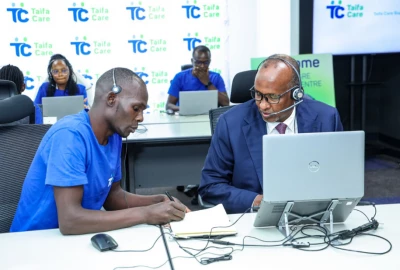J
Joseph Muia
Guest
doctype html>

Health CS Aden Duale in a meeting with the Council of Governors (CoG), chaired by Ahmed Abdullahi, on UHC staff transition on September 2, 2025. PHOTO | COURTESY | MoH
Health Cabinet Secretary Aden Duale has hailed the Taifa Care Support Centre, describing it as a game-changer in Kenya’s push for citizen-centred healthcare.
In a statement issued on Tuesday, Duale said the centre, which operates the 147 hotline, has already received over one million calls since the launch of the Social Health Authority (SHA) in October 2024.
He said the platform is critical in the government's push to advance the Universal Health Coverage (UHC) goal for its citizens.
“Powered by the Digital Health Agency (DHA), the Taifa Care Centre acts as a direct link between Kenyans, providers, and the government. It is about building trust and ensuring your concerns directly shape the way we deliver Universal Health Coverage,” stated Duale.
According to the CS, the Taifa Care Centre is also helping the ministry resolve issues in real time while also providing crucial feedback to improve services.
He further revealed that the ministry is leveraging technology to expand access, adding that the ministry plans to introduce AI chatbots to make services even more accessible.
The CS urged Kenyans who are yet to enrol to register via *147# or through the AfyaYangu platform, and to report any service concerns through the toll-free number 147.
The programme is a key pillar of President William Ruto’s manifesto, aimed at ensuring equitable, quality, and affordable healthcare for all Kenyans.
Prior to the launch of SHA, the government laid the groundwork by passing legislation in 2023 to anchor the program.
The Taifa Care program operates through three key funds: the tax-funded Primary Healthcare Fund, the Emergency, Critical, and Chronic Illnesses Fund, and the contributory Social Health Insurance Fund (SHIF).
Salaried Kenyans contribute 2.75% of their monthly gross income to SHIF, while non-salaried individuals pay an equivalent annual amount.
©Citizen Digital, Kenya
Continue reading...
- Duale said the centre, which operates the 147 hotline, has already received over one million calls since the launch of SHA in October 2024.
- He said the platform is critical in the government's push to advance the UHC goal for its citizens.

Health CS Aden Duale in a meeting with the Council of Governors (CoG), chaired by Ahmed Abdullahi, on UHC staff transition on September 2, 2025. PHOTO | COURTESY | MoH
Health Cabinet Secretary Aden Duale has hailed the Taifa Care Support Centre, describing it as a game-changer in Kenya’s push for citizen-centred healthcare.
In a statement issued on Tuesday, Duale said the centre, which operates the 147 hotline, has already received over one million calls since the launch of the Social Health Authority (SHA) in October 2024.
He said the platform is critical in the government's push to advance the Universal Health Coverage (UHC) goal for its citizens.
“Powered by the Digital Health Agency (DHA), the Taifa Care Centre acts as a direct link between Kenyans, providers, and the government. It is about building trust and ensuring your concerns directly shape the way we deliver Universal Health Coverage,” stated Duale.
According to the CS, the Taifa Care Centre is also helping the ministry resolve issues in real time while also providing crucial feedback to improve services.
He further revealed that the ministry is leveraging technology to expand access, adding that the ministry plans to introduce AI chatbots to make services even more accessible.
The CS urged Kenyans who are yet to enrol to register via *147# or through the AfyaYangu platform, and to report any service concerns through the toll-free number 147.
The programme is a key pillar of President William Ruto’s manifesto, aimed at ensuring equitable, quality, and affordable healthcare for all Kenyans.
Prior to the launch of SHA, the government laid the groundwork by passing legislation in 2023 to anchor the program.
The Taifa Care program operates through three key funds: the tax-funded Primary Healthcare Fund, the Emergency, Critical, and Chronic Illnesses Fund, and the contributory Social Health Insurance Fund (SHIF).
Salaried Kenyans contribute 2.75% of their monthly gross income to SHIF, while non-salaried individuals pay an equivalent annual amount.
©Citizen Digital, Kenya
Continue reading...

